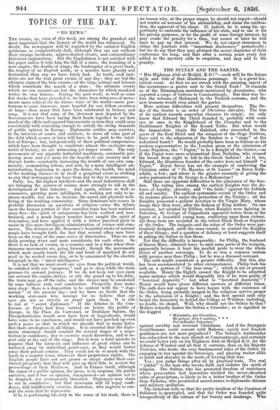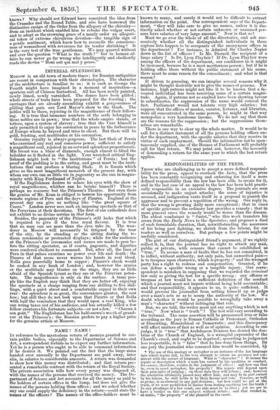THE SULTAN AND THE GARTER.
" His Highness Abd-ul-Medjid, K.G.! "—such will be the future style and title of that illustrious personage. It is a great his- torical event. At first we are struck with the amusing aspect of the occurrence—a garter sent to the Grand Turk ! It reminds us of the Birmingham merchant mentioned by Anastasius, who exported a cargo of buttons to Constantinople. But that was be- fore the reforms of Mahmoud in the Turkish costatie, and the new trousers would even admit the garter. More serious difficulties will present themselves. The Or-
der of the Garter is an order of Christian chivalry. The loss of its earliest records somewhat obscures its origin ; we only know that Edward the Third founded it, probably with some eye at once to the Knighthood of the Crusades and to the traditionary Knights of the Round Table. But what would the immaculate virgin Sir Galahad, who succeeded in the quest of the Real Blood and the conquest of the Siege Perilous, have said to the admission of the Soudan to. a "siege" at the redoubted board ? He would probably have been as furious as his modern representative in the London press at the admission of Louis Napoleon, the " Papist," to be a Knight of the Garter,—as if the Papist were more schismatical than Nicholas, who crossed his breast from right to left in the Greek fashion As if, too, Edward, the illustrious founder of the order were not himself " a Papist." Royal Savoy has set the example of conferring the Christian order of " St. Maurice et St. Lazare " on Baron Roth- schild, a Jew ; and where is the greater enormity of giving the order patronized by St. George to a Mahometan ?
Still there are apparent difficulties to the admission of the Sou- dan. The ruling idea among the earliest Knights was the de- fence of loyalty, chivalry, and " the faith," against the Infidels all and sundry. The earliest systematic record of the Order and its statutes places it under the protection of the Trinity ; all the Knights possessed a gallant devotion to the Virgin Mary, whose image they then wore, after the fashion of King Arthur. On one occasion, not adopted by Gibbon, when Knights were fighting in Palestine, St. George of Cappadocia appeared before them in the
e of a beautiful young man, conferring upon them victory. All these facts are recorded in the velvet Black Book or Register of the Order. The insignia and the robes of the Order were par- ticularly designed, saith the same record, to remind the Knights of these things ; and a question of delicacy at least suggests itself in asking the Sultan to don them.
Not that the difficulty is insuperable ; for Philip, the husband of Queen Mary, obtained leave to omit some parts of the insignia, apparently because it hurt his morbid pride to wear the whole livery of another sovereign. To do so was a common custom with greater men than Philip ; but he was a diseased recreant.
The oath might constitute a greater difficulty. But this also has been accommodated to other circumstances. Philip took his oath on a portion of " the true cross " • which is not at present available. Henry the Eighth caused the Knight to be admitted under statutes which would disqualify him if he were guilty of "heretical depravity" : but what is "heretical depravity" ? Henry would have given different answers at different times. The oath does not appear to have begun with the existence of the Order, being probably merged in the religious service proper to the admission of a Knight; and the first special oath only bound the fraternity to defend the College at Windsor, including, no doubt, its chapel. Well, why should not the Sultan do that ? Moliere actually makes the Sultan a Crusader; as is signified in the doggrel
" Mahameta, per Giourdina, Mi pregar, sera a mattina, * * * Per deffender Palestina,"
against scrubby and recreant Christians. And if the Bourgeois Gentilhomme could consort with Mahoun, surely real English gentlemen are not more prejudiced ? The Sultan's Ambassador has subscribed to the new church at Constantinople, and certainly we could better rely on his Highness Abd-ul-Medjid K.G. for the defence of Windsor and all that it contains, than on his Majesty Nicholas, who broke the very fundamental ;tiles of the Order, by
engaging in war agairtst his Sovereign, and playing traitor alike to truth and chivalry in the mode of levying that war. Yes ; you judge things after all by practical tests. The real " infidel" is the man who breaks faith and violates the spirit of religion. The Sultan, who has promoted freedom of conscience where persecution had heretofore wielded the never-sheathed sabre of proselytism, is likely to be a better brother of the Order than Nicholas, who prostituted sacred names to diplomatic chicane and military spoliation. The historian tells us that the pretty incident of the Countess of Salisbury is apocryphal, and that the Order was founded quite irrespectively of the virtues of her beauty and stockings. Who
knows ? Why should not Edward have conceived the idea from the Crusades and the Round Table, and also have borrowed the distinctive ensign of the Order from the allegory of the chivalry— from an. incident which enabled him to rebuke the vulgar court, and to adopt as the crowning grace of a manly order an allegori- cal token of extreme chivalrous devotion—the tangible sign of a gentle sentiment, which knew how to reconcile the conscious- ness of womanhood with reverence for its tender shrinking ? It is the very test of the true gentleman. We may quarrel without end over the question " What is the truth ? " but in human af- fairs he can never go far wrong who intelligently and obediently reads the device " Honi soit qui mal y pense."



































 Previous page
Previous page